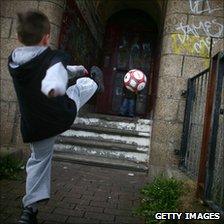Child poverty 'rises' among working households
- Published

Welfare reform alone is not enough to tackle exclusion, the charity says
Child poverty within working households is rising and now accounts for 58% of all UK cases, a report has found.
A Joseph Rowntree Foundation report says there are 2.1 million impoverished youngsters in homes where parents are in work - up slightly on last year.
Co-author Tom MacInnes said it showed work alone was not the answer to lifting people above the bread line.
The Department for Work and Pensions said it was reforming the welfare system to ensure work always paid.
Overall, the number of children living in poverty fell to 3.7 million, the report called Monitoring Poverty and Social Exclusion found.
'Chronic problem'
Mr MacInnes said: "With more than half of all children in poverty belonging to working families, it is simply not possible to base anti-poverty policies on the idea that work alone is a route out of poverty," he said.
"Child poverty in working households must be given the same focus as out-of-work poverty. Until this happens, debates about poverty will continue to be misleading."
The report also said that the number of impoverished children living in households where no-one worked had fallen to 1.6 million, the lowest that figure had been since 1984.
He added that the fall in child poverty among out-of-work households came despite an estimated rise of 60,000 children in those homes.
"So, we can almost certainly say that it is related to the rise in both child benefit and child tax credit in 2008," he explained.
"Without the substantial increases in these benefits, the numbers of children in poverty would be around half a million higher."
The report also found:
Between 2008-9, 13 million people in the UK were living in poverty
Of these, 5.8 million (44%) were in "deep poverty"
By mid-2010 one in five 16 to 24 year olds were unemployed - the highest for 18 years and three times that for other adults
By mid-2010, almost 2.5m people in the UK were unemployed - up slightly on 2009
Co-author Anushree Parekh said: "The high level of young adult unemployment has been a striking feature of this recession.
"One in five adults aged under 25 who are looking for work cannot find it. But young adult unemployment has been rising since 2004 - this is a long term, chronic problem."
The foundation's chief executive, Julia Unwin, said welfare reform alone was nowhere near enough to reduce social exclusion.
The government faced many challenges, not least educating young adults, tackling health inequalities and improving access for poor families to essential services, she said.
A household is considered to be below the poverty line if its income is less than 60% of median household income.
The charity Save the Children said the report showed that for 2.1 million families, work did not pay enough to keep them and their children out of poverty.
Head of UK policy Sally Copley said: "The danger is that cuts to working tax credit and childcare support will further penalise working families already struggling to make ends meet."
A Department for Work and Pensions spokesman said: "Over the last decade vast sums of money have been poured into the benefits system in an attempt to address poverty, but as today's report shows, this approach has failed.
"Work is the best way out of poverty which is why we are radically reforming the welfare system to ensure that work always pays and people aren't trapped in a cycle of dependency and worklessness."
- Published14 October 2010